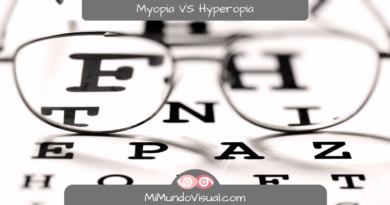7 Questions To Get Familiar With Myopia?
Table Of Contents
Myopia is not just a problem that causes blurred vision; it is an ametropia. It is a refractive defect that is increasingly impacting our society today because of the large number of people who suffer from it.
“Myopia has become a common problem affecting almost a third of the world’s population, turning it into an important challenge for Public Health,” as Flórez Revelo, V. A. indicates in his paper ‘Systematic Review of the Pathophysiology of Pathological Myopia—the importance of genetics.

# Question 1: Why Does Nearsightedness Occur?
Nearsightedness occurs because the images received by the eye, instead of focusing on the retina, are focused in front of the retina.
The nearsighted eye has too much refractive power for its axial length, i.e., the eyeball is too long.
It may also be because the curvature of the cornea or lens is too steep. In addition, a combination of the two factors is also possible in some cases.
# Question 2: What Are The Causes Of Myopia?
Although the exact causes are not yet known, the origin of Myopia may be associated with a failure of the various components of the visual system (pronounced axial length, corneal curvature, lens power, and anterior chamber depth).
However, Myopia can also have other causes:
Pathological: Diseases such as diabetes, some types of cataracts, or keratoconus (degenerative pathology of the cornea) can cause Myopia, either temporarily or permanently.
Genetics: Myopia can also be hereditary. If one or both parents have Myopia, there is a genetic predisposition. However, it does not have to be this way.
Toxic: Consuming certain substances can cause alterations in vision temporarily or permanently.
Environmental: Not doing enough outdoor activities during childhood or working with electronic devices for too long without adequate light could be related to the onset of Myopia, according to some studies.
One of the most common vision disorders worldwide is Myopia.

# Question 3: How is Myopia detected?
Myopia may be associated with some of the following symptoms:
- Seeing distant objects blurred
- Squinting when trying to focus on objects
- Zooming in on objects due to lack of sharpness in farsightedness
- Headache
- Visual fatigue
Myopia can be diagnosed through an eye examination through a refractive evaluation. The eye specialist will be able to assess whether you have Myopia or any other refractive defect.
The evaluation process includes the use of instruments and visual tests. Consider that the ophthalmologist will likely dilate the pupils with some eye drops for a more accurate assessment.
The graduation of Myopia is prescribed with negative diopters. If you have doubts about what diopters are, read this one here.
# Question 4: What happens if Myopia is not treated?
The untreated nearsighted person will be more limited in the area where they can see clearly.
They can focus on objects at a close distance but see them far away as blurry. This can lead to eye fatigue, headaches, and reduced school and work performance.
In addition, failure to treat Myopia can compromise both the safety of the person with Myopia and the safety of others.
If we talk about high Myopia or Myopia Magna, this may be accompanied by a higher risk of ocular pathological changes such as glaucoma, cataracts, myopic macular degeneration, or retinal detachment, which can cause irreversible vision loss.
Therefore, it is important to have regular check-ups that allow our ophthalmologist or optometrist to detect Myopia in its early stages and treat it as soon as possible.
# Question 5: How is Myopia corrected?
There are different types of treatment to correct Myopia, optical and surgical:
Optical treatments:
Myopia can be corrected with optical treatments: use of glasses (spectacles) or contact lenses (contact lenses).
Another type of optical treatment for Myopia is orthokeratology (ortho-k). These are lenses that are worn at night and allow the nearsighted person to avoid having to wear glasses or contact lenses during the day.
Surgical treatments:
Surgical treatments with the implantation of ICL-type phakic intraocular lenses or laser refractive surgery can also correct myopia.
# Question 6: Why does Myopia evolve?
Myopia evolves just as the person who suffers from it does. In the same way, that the child grows, so do his eyes, and they get bigger, so they can also increase the diopters needed to be able to see distant objects clearly.
Let us remember that Myopia may be due to an anomalous shape of the eye, where the eye is longer than normal.
In turn, there is research that considers that environmental factors and our lifestyle, where work and leisure activities prevail in near vision, a decrease in outdoor activities, and access to new technologies may be related to the increase in Myopia.
# Pregunta 7: ¿Cuándo se detiene la miopía?
Nearsightedness usually begins in childhood, may increase as a child grows and develops, and stabilizes as a child reaches adulthood. Sometimes, however, it can also continue to increase with age, as in the case of Myopia Magna.
In recent years, different studies indicate that some treatments could help reduce the progression of Myopia:
- Atropine
- Orthokeratology
- Multifocal or peripheral defocusing contact lenses.
- Multifocal and/or bifocal ophthalmic spectacles.
The first treatment, atropine, is a drug that controls accommodation.
Both orthokeratology and multifocal or peripheral defocus contact lenses are contact lenses that correct peripheral hypermetropic defocus, shaping the cornea during the night in the case of orthokeratology and placing a multifocal optical design in front of the visual axis in the case of multifocal contact lenses.
Finally, ophthalmic spectacles are lenses where the central part allows the correction of Myopia, and the peripheral part is more powerful, helping the myopic eye to adjust according to the position of its gaze.
We do not want to finish this article without reminding you that it is of vital importance to go to an eye specialist in case of doubt and to have a regular check-up in order to detect any anomaly in our vision as soon as possible since our health and that of our family depends on it.
También te puede interesar…




